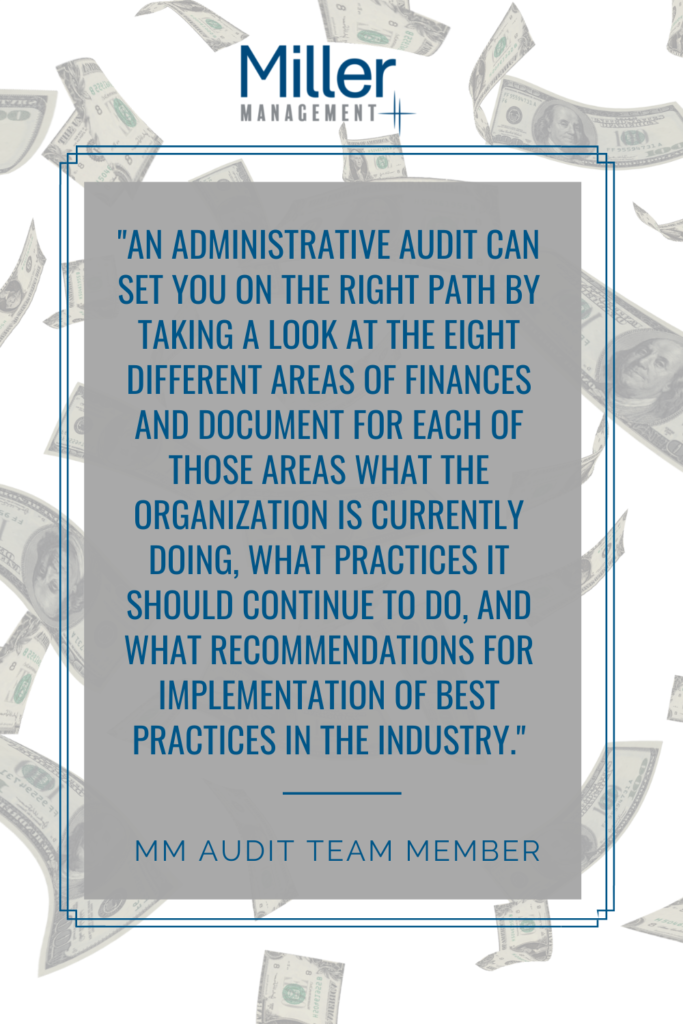February 24, 2022
Financial Audit First Steps
A few times a year, Miller Management receives a request that sounds something like: We have a denominational requirement that our ministry should have an outside party perform an audit. Can you help?; or:
| “I am new to the pastorate and found that our church constitution requires us to have a financial audit done. Unfortunately, the church has never followed through with it. I am looking for help and information to get this done.” |
Meaning of the Financial Audit Requirement
Here is what we tell these people looking for help.
The first step is to take a closer look at the by-laws, and what specifically they are requiring, or the intent of including this requirement. Does it ask for a CPA administered audit or just an Administrative Audit? Or can the organization perform their own internal audit? Once you know the type of audit required by the by-laws, then you know how to prepare. If you are unclear by your reading, reach out to your board or leadership for clarification.
For a CPA Audit the AICPA has a great white paper on the nature of this type of audit. Specifically, to make sure that your organization is utilizing good accounting principles and also has good anti-fraud measurers in place. (Note, no tax returns will be included in this process.) With this requirement you may experience some sticker shock at first, but remember you are paying for accountability and assurance of good processes. MM does not handle these requirements, but we would refer you to Keller & Owens.
If an Administrative Audit is what your by-laws require, then the rest of this post will help you out. Some of the documents needed for this include: the organizations general ledger, checks, trial balance, financial statements, and access to documents to test against procedures.
Lastly, if an internal audit is the requirement, then you can form a committee to test documentation and procedures. Capin Crouse has an article with internal audit requirements and procedures if you’d like more information about this type of audit.
What is an Administrative Audit?
Administrative Audits are a hands-on resource that Miller Management highly values. Our Administrative Audit provides an objective, third-party assessment of administrative transactions, financial reporting, policies and procedures, and administrative functions relating to the financial dealings of the church or nonprofit organization. During this process, we take a closer look at each department and produce strategies to limit the real or perceived opportunities you may have open in your specific organization.
New to Anti-Fraud Measures? Start here.
Steps to Get Ready for the Financial Audit
First, know the requirements for the type of audit your by-laws require and what information you need to prepare for that particular audit. If you must outsource your audit, the firm that you hire should have a helpful list of items and let you know the preferred format for each item. Don’t worry about asking too many questions; truth be told, these people are passionate about what they do and can’t wait to help you understand more. Reach out to your team early and often to make sure you are ready on the big day.
Second, you are going to have to do the work. The first audit your organization gets ready for will be the most time-consuming one. After you’ve gotten a few under your belt, you’ll come to know how to better prepare for these. Gathering information all year long (instead of in one afternoon the day before the audit team arrives) is a much better strategy.
Third, you’ll want to understand your organization’s financials. If this is something you struggle with as a “non numbers person” you may want to start here to learn how to read your financial statements. After that part is figured out, you’ll want to move into the organizations policies and procedures. This is another big area for Administrative Audits as we go in depth in every department.

Another resource on audits
We will leave you with this quote from the ECFA. While this write-up is specifically for ECFA members, there are still some good nuggets in the article. Specifically, their summary:
“Summary. Financial statements prepared by an independent CPA, with the CPA approved by the board, are a key element in informing donors and other constituencies about the organization’s financial affairs and its worthiness to receive support.”
– ECFA Standard 3 – Financial Oversight
And that right there folks, is probably the main reason behind the intent of the audit. To keep your organization accountable and show that you are a trust-worthy source to donate to. For those of us doing this Kingdom work, we should view financial audits as great comforts, not huge hassles.
Stay Connected